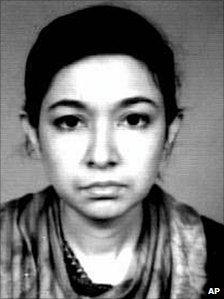US jails Pakistani scientist for 86 years
- Published

Aafia Siddiqui's lawyers argued she was mentally ill
Aafia Siddiqui, the female Pakistani scientist convicted of attempting to kill US military personnel, has been sentenced to 86 years in prison.
Siddiqui was being interrogated by US officials in Afghanistan when she grabbed a rifle and opened fire, shouting "death to Americans".
Prosecutors in New York called her an al-Qaeda sympathiser and sought life imprisonment.
Protests broke out across Pakistan after the sentence was announced.
"As a unanimous jury found beyond a reasonable doubt, Aafia Siddiqui attempted to murder Americans serving in Afghanistan, as well as their Afghan colleagues," said US Attorney Preet Bharara said in a statement.
"She now faces the stiff consequences of her violent actions."
Prosecutors used notes she was carrying at the time of her arrest, which included references to constructing dirty bombs and a list of New York City landmarks, as evidence that she was a potentially dangerous terrorist.
She was also carrying sodium cyanide, a toxic substance.
Siddiqui's lawyers argued she was mentally ill.
Siddiqui is a neuroscientist who had studied at the prestigious Massachusetts Institute of Technology in the US before returning to Pakistan and marrying a relative of accused 9/11 mastermind Khalid Sheikh Mohammed, the court heard.
Plea for peace
Her case attracted attention from human rights groups amid claims from her family that she had been tortured.
Siddiqui was vocal during her trial, which resulted in her ejection from the courtroom on several occasions.
In a statement before the court on Thursday she denied allegations she had been tortured while in jail in the US. "This is a myth and lie and it's being spread among the Muslims," she said.
"I do not want any bloodshed. I do not want any misunderstanding. I really want to make peace and end the wars."
After sentencing, demonstrators in Pakistan took to the streets in Karachi, Lahore and Peshawar, burning US flags and effigies of US leaders.
They chanted anti-American slogans, and demanded that the US reverse its decision.
Some supporters said they would now march on the US consulate and attack it if Siddiqui was not released.
Right-wing groups and political parties, in particular the Jamaat-e-Islami, have called for a day of protest across Pakistan on Friday.
Siddiqui's sister, Dr Fowzia Siddiqui, said the sentence would "prove to be harmful for the US, in every way".
"This decision proves that the system of justice that the US believes is its pride is no longer effective. This is the beginning of the decline of the US. God willing, I will definitely bring Aafia back home."